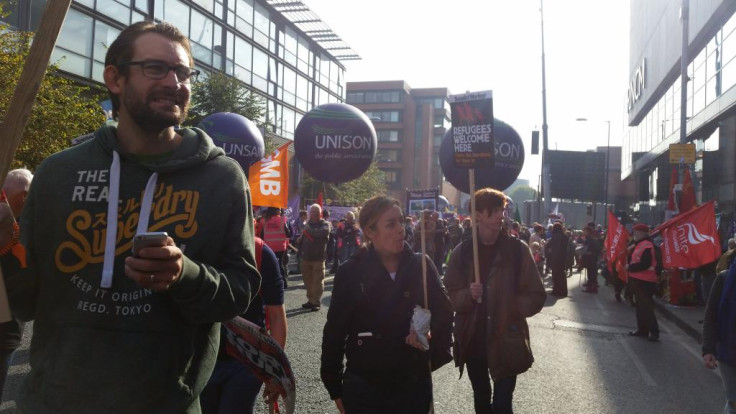Don't let an egg-throwing minority define a popular resistance to the Tories and their cuts

Often when left-wingers criticise violence at protests, we're asked whether there are any circumstances under which we would condone similar violence. Or at least, circumstances under which we would accept it.
References might be made to the direct action tactics used by Nelson Mandela, or perhaps the Suffragettes. The suggestion is that by condemning spitting, egg throwing and the odd sly kick from behind a barricade, we're missing the bigger picture.
While acts like these might be unpleasant, the indirect violence of austerity is much more brutal. Being hit with an egg is nothing compared to being forced out of your home and left unable to feed yourself and your family.
Commitment to objectivity aside, journalists are only human, and if you spit in their face they're unlikely to stand and listen while you explain the noble reasons why you did it
The fear of walking past screaming, spitting protesters soon passes, but the stress and hardship caused by benefits sanctions leaves a lasting psychological toll. If you devote attention to relatively trivial acts of aggression by some anti-austerity protesters outside the Conservative Party conference, not just the actual reasons for the protest, you need to seriously rethink your priorities.
There are actually two slightly different versions of this argument. The logic of the first is familiar to all but the strictest pacifists: some amount of violence is acceptable if it serves to prevent or end a greater harm. If violent protest is what it takes to force changes in policies that cause severe suffering, so be it. It's the lesser evil. This is the position generally adopted by people who engage in protest violence themselves.
One obvious problem with this: it's not clear that egging and spitting at people as they walk into the Conservative conference genuinely does serve any tactical purpose. Call it a failure of imagination, but the only methods of provoking policy change that I can think of involve convincing people who aren't already on your side. True, Tory delegates probably weren't going to hear you out anyway, but booting them in the shins is hardly going to encourage empathy.
Commitment to objectivity aside, journalists are only human, and if you spit in their face, they're unlikely to stand and listen while you explain the noble reasons why you did it. Even if you hope to bypass the mainstream media and communicate with members of the public directly, a lot of ordinary people are going to be repulsed by reports of violence at the demonstration. Yes, some of them were never going to care about the victims of austerity either way.
Others might have, though. Cuts have been concentrated in specific areas of spending, meaning that many people haven't really been affected and don't realise quite how bad things are for those who have. Surely, these are the people you've got to try and reach if your protest is going to have any impact. It's reasonable to assume that most will be less inclined to take lessons in compassion from individuals they see behaving aggressively.
This fact is recognised implicitly by people who make a second, slightly different argument against condemning protest violence: that discussing it at all plays into the hands of right-wingers who want to discredit anti-austerity protests wholesale. If you discuss the regrettable actions of a minority, the logic goes, you're helping make that the story rather than the impact of the harsh spending cuts that prompted the demonstration in the first place.
I have slightly more sympathy for this perspective. I do believe the harm caused by government austerity vastly outweighs that caused to Conservative conference attendees by a relatively small number of anti-austerity protesters. Especially as 150,000 vulnerable elderly people have lost all support from carers.
Child protection services have had their budgets slashed. Welfare cuts have been blamed for a 40% rise in homelessness since David Cameron came to power. Tax credit cuts are going to leave three million working families worse off, many of whom are already struggling to make ends meet. A coroner recently found "his recent assessment by a DWP doctor as being fit for work" was the trigger that caused a man with severe mental health problems to commit suicide. The relative levels of suffering are basically incomparable.
Much less convincing, though, is the idea that left-wingers condemning violence by protesters are to blame for for distracting from the anti-austerity message. That to do so is a betrayal of the majority of peaceful protesters, many of whom have been victimised by the spending cuts they're protesting against.
The only people responsible for distracting from the real issues with petty violence are those who actually perpetuate that violence. They've already provided more than enough ammunition for critics with a vested interest in misrepresenting all of the protesters as "thugs".
To protest is, at least partially, to engage in a PR war. You're trying both to inform people and to convince them to see things the way you do. If swaying public opinion to the extent that current government policy becomes untenable isn't a major goal of the anti-austerity movement, what exactly is the point?
Everyone who's paid attention to the news over the past couple of days knows there has been violence by protesters outside the Conservative Party conference. If we wish to combat narratives that paint all protesters as violent, the non-violence majority to make themselves heard.
This means acknowledging the bad behaviour of a minority and drawing a sharp line between that and the legitimate, legal actions of most demonstrators. The only alternative is to be dismissed as hypocrites or worse, alienating a large number of potentially sympathetic observers in the process.
Abi Wilkinson is a freelance journalist based in London who writes about politics, inequality, gender and internet culture, among other topics.
© Copyright IBTimes 2024. All rights reserved.







